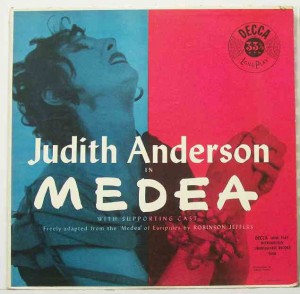Medea (Médea, 1949)
 Robinson Jeffers. Alžbětinská úprava klasické řecké tragédie (Euripides).
Robinson Jeffers. Alžbětinská úprava klasické řecké tragédie (Euripides).
Osoby a obsazení: Médea (Judith Anderson), Kreont (Raymond Edward Johnson), chůva (Doris Rich), Iáson (Arnold Moss), Aegeus (Everett Sloane), řecké ženy (Vera Allen, Doris Rich).
Natočeno 1949. Vydala Decca v roce 1949 (1 LP, Decca DLP 9000).
Na Youtube existuje i ukázka z televizního záznamu z roku 1959. S Judith Anderson účinkují Morris Carnovsky (Kreont) a Aline MacMahon (chůva).
Australian actress Judith Anderson made her professional debut in Sydney at the age of seventeen. Early success in Australia encouraged Anderson to travel to the United States in 1917 in hopes of landing parts in Hollywood movies. She was unsuccessful, however, owing in part to the fact that the American film industry then favored tall actresses (Anderson was only five feet four inches tall). From this uncertain beginning, Judith Anderson would go on to become a leading actress throughout the 1930s and 1940s, and a well-known figure in theater, movies, and television until her death in 1992.
Undeterred by her disappointing experiences in the young movie industry, Anderson moved to New York to pursue work in the theater. She struggled at first, working irregularly, but she soon made her Broadway debut in Martin Brown’s Cobra. By the late 1920s, her performances in dramas such as Eugene O’Neill’s Strange Interlude and Mourning Becomes Electra earned Anderson a reputation as an actress whose performances displayed emotional depth and intensity.
Anderson achieved fame as a classical actress with roles including Hamlet’s Gertrude, in a production with John Gielgud playing the title role and Lillian Gish as Ophelia, and Lady MacBeth opposite Sir Laurence Olivier in a London production in 1937 and Maurice Evans’s production on Broadway in 1941. Anderson won a Tony award in 1948 for her performance in Medea in a version written by the poet Robinson Jeffers.
Jeffers, Anderson’s long-time friend, wrote his adaptation of the play specifically for her, and her performance of the dark and ruthless character was highly praised by critics. In his review of her performance (which he said would “[make] your scalp tingle”), Brooks Atkinson wrote: Hell hath no fury like Judith Anderson as Medea. For Medea is a woman who has been spurned and Miss Anderson, always a superb actress, is now crowning her career with an inspired performance of rage and revenge. . . . The performance is a fluid pattern of minor impulses—anger, guile, cunning, tenderness, malice, doubt, and resolution.
Despite her early failure in Hollywood, later in her career Judith Anderson appeared in a number of movies, often to great acclaim from reviewers and audiences. Anderson was, in fact, nominated for an Oscar for her performance as Mrs. Danvers, the creepy and cold housekeeper in Alfred Hitchcock’s Rebecca. Perhaps her most famous film performance, however, is her portrayal of Big Mama in the 1958 adaptation of Tennessee Williams’s Cat on a Hot Tin Roof, in which she appeared with Paul Newman, Elizabeth Taylor, and Burl Ives. Later, Anderson played Minx Lockridge on NBC’s popular soap opera Santa Barbara and she appeared in Star Trek III: The Search for Spock as a Vulcan High Priestess. Though these projects diverged from her earlier classical theater work, they were among her most popular roles.
In 1960, Queen Elizabeth II knighted Judith Anderson, conferring upon her the title Dame Commander of the British Empire for her contributions to the theater. Anderson was the first Australian-born actress to receive such an honor.
If you enjoyed this post, please consider to leave a comment or subscribe to the feed and get future articles delivered to your feed reader.






Komentáře
Zatím nemáte žádné komentáře.
Napište komentář k článku